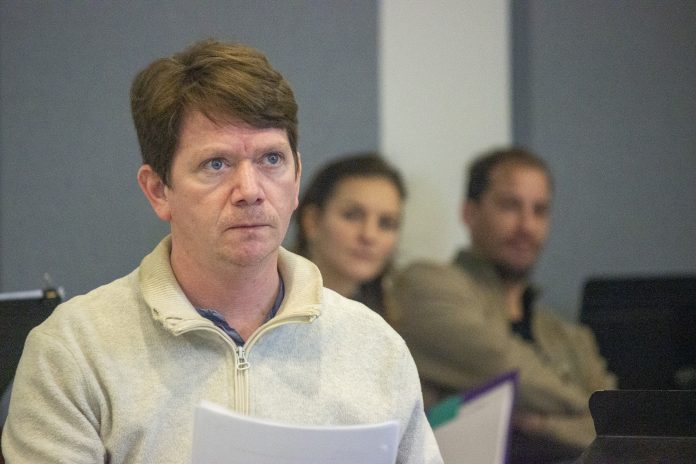Out actor Keith J. Conallen didn’t have to travel far to build a successful career as an entertainer. The Philadelphia native and Temple graduate has been a fixture on local stages for two decades, picking up several Barrymore nominations and earning acclaim from critics and audiences alike. Conallen’s career has encompassed everything from world premiere plays to the classical canon, with no end in sight.
Although Conallen has appeared with most of the major theater companies in the city, in recent years he has found success as a member of Wilma HotHouse, the Wilma Theater’s resident acting company. He will next be seen onstage at the Wilma in Rajiv Joseph’s “Describe the Night” (running Jan. 28-Feb. 16), playing a character with a curious contemporary cultural significance. Other recent credits with the HotHouse include “Dance Nation,” “Romeo and Juliet” and “When the Rain Stops Falling,” for which he shared the Barrymore Award for Outstanding Ensemble.
PGN spoke with Conallen about his approach to acting, the kinds of roles he’s drawn to and why he prefers the stage to other mediums. Some responses have been condensed and edited for clarity.
What drew you to a career on stage?
I suppose it started back in high school. I thought when I was younger that I was going to be a writer, and I also enjoyed singing. Somehow the musical came around my senior year and I thought, “Why not?” I found that I really enjoyed being on the stage. I thought that even if I did want to continue pursuing writing, I could move that into playwriting instead of novels or journalism. Acting then sort of took over all my focus.
Did you know from the beginning that you wanted to build your career in Philadelphia?
Yes. I’m definitely a hometown boy. I really didn’t have any intention of moving to New York or pursuing that angle of the acting business — especially because, as part of my training at Temple, I had to go around to different theaters in the city and view the shows that were being produced. I got to look around and see there was work here. When I left Temple, and after taking some time off to have a job and put some money in the bank, I started auditioning. It became very clear to me that if you did the work and put your face out there, that you could have a very strong career here without having to do the New York or Los Angeles scene.
You’re now a core member of Wilma HotHouse. What prompted you to join the company?
Before the company was officially formed, Blanka [Zizka, the Wilma’s artistic director] was inviting certain actors from around town to be part of larger workshop training sessions with gurus she would find and do her research on. I was invited to a couple of those early workshops. One was very specifically about primitive voice and another focused on your core training, which is a very physical practice. From that, because we were focusing so much on the voice and the body without relying just on predetermined choices, that drew me into a real organic way of thinking about theater. It connects to the reason why I was never really interested in TV or film — it didn’t live for me in the way that I needed art to live.
Can you talk a little about “Describe the Night” and the character you’re playing?
“Describe the Night” spans about 90 years, going from 1920 to 2010. My character, Vova, is introduced in 1989. We’re not doing a complete mimic, but he is Vladimir Putin very specifically. But I’m not doing an accent or wearing a hairpiece or anything like that. It’s essentially about Russian powers and the concept of truth and lies. How are lies masked as truth, or how does saying something make it true, even if it’s false? Especially with our era of fake news right now, to consider all of that, and the way Russian politics have buried truths over the years, it’s a great allegory for the time. “Describe the Night” is basically about truth and lies, and how we tell what’s real and what’s not.
As an actor, what do you look for in a role?
For the most part, when I’m cast in a play, I try to find my personal connection to it and find the humanity in that person. Even playing Putin, there still has to be something inside of him, because he is a human being. There has to be something that’s me walking into the role and saying, what is it about me that can live here. I’ve been able to do that a number of times, luckily. I always try and find something in the character to connect to and hold onto.
For tickets and information about “Describe the Night,” visit wilmatheater.org.
